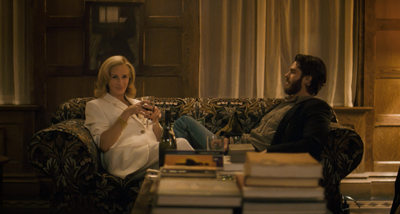“Not everything is supposed to make you comfortable.”
Distinguished Yale law philosophy professor Alma Inhoff (Julia Roberts) icily delivers this line after her star student, Maggie Price (Ayo Edebiri), meekly tries to end a conversation by saying, “I’m not comfortable having this conversation with you anymore.”
This face-off between the two women represents one of the many tensions at the center of Luca Guadagnino's latest, After the Hunt — the clash between two generations of feminism. Alma, a Gen-Xer, fought her way through the male-dominated world of academia by building up a facade of Sphinx-like invulnerability, making her — as she worries to her psychoanalyst husband Frederik (Michael Stuhlbarg) — “cold and unfeeling.” She drowns the weight of both past and present allegations — and the looming threat of not receiving tenure — with whiskey, cigarettes and retching into the toilet bowl. Maggie, on the other hand, is an avatar for everything older generations scorn about Gen Z: over-therapized and “possessive to their pain,” as Frederik opines.
But this all takes place after the titular hunt, which is quite swift. “It happened at Yale,” a title card reads. The “it” in question could refer to any of the hundreds of #MeToo fallout moments at universities in recent years — or in any other industry, for that matter. Fittingly enough, the text used in the title card is in an identical typeface employed by Woody Allen.
A dinner at Alma’s is set up like a scene from an Allen film. Maggie and jeans-clad, pompous but charming assistant professor Hank (Andrew Garfield) compete for Alma’s attention in the warmly lit, high-ceilinged apartment, which is full of fellow New England intellectuals. Alma’s colleague Kim (Chloë Sevigny) playfully banters about how Freud’s misogyny and Nietzsche’s politically incorrect beliefs could get them booted from the curriculum.
The next day, Maggie confides that Hank “crossed the line” after walking her home and asking for a nightcap. Alma hesitates; Hank insists the accusation is a cover for Maggie’s plagiarized thesis. It doesn’t matter — Hank is fired and throws a public fit. The hunt is over.
During the “after” is where we wait for Guadagnino to deliver something biting and thought-provoking about his subject matter. Who will Alma pledge loyalty to? Who’s hiding what, and how do they use their positions and identity to weaponize and victimize?
While race, class, gender, institutional politics, sexual assault and philosophy are all featured heavily throughout the film, After the Hunt doesn’t really offer anything new about any of these subjects. This is likely an intentional choice, establishing a vague sense of authority over the state of cultural affairs by refusing to explore things beyond the surface level. These circumstances are just opportunities for characters engage in self-obsessed verbal sparring.
Guadagnino clearly had a blast pressing the “discourse” button. There’s a moment when Edebiri's character is conveniently standing behind a poster for a campus event called “The Future of Jihadism Is Female.” Sevigny sings along to “Heaven Knows I’m Miserable Now” by The Smiths in a college bar and quips that she’s surprised they're “allowed” to play Morrissey.
Luca Guadagnino's new Zendaya-starring feature opens wide this week
Guadagnino is a master of style, but his love of the human form and intricate sound design — which triumph in Challengers and Call Me by Your Name — fall flat here. The intense close-ups and inserts of trembling hands add up to little. These characters don’t feel inhabited by real people, and their motivations are unclear. Even Trent Reznor and Atticus Ross’ score — usually an essential undercurrent — crashes. There’s a ticking-clock motif that builds to a nonexistent boiling point.
After the Hunt is nearly redeemed by Roberts’ performance. She’s commanding, haunted and cool all at once. It’s exhilarating to see the seasoned star sink her teeth into the material, even if it’s unclear what exactly she’s supposed to be chewing on. Edebiri, despite how little her character is fleshed out, convincingly portrays a wounded idealist.
It's clear that hidden somewhere inside After the Hunt is a thesis on power and pain, but it ultimately plays as a confused, drawn-out seminar. Still, thanks to Roberts’ prowess and Guadagnino’s eye, it looks almost convincing.






